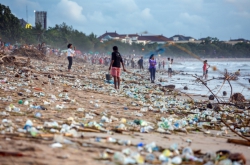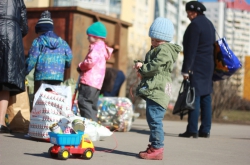The main purpose of the project is to modernize and internationalize higher education in environmental protection in Russia and Kazakhstan.
The project was initiated by ITMO University. Three years ago, Olga Sergienko, head of the Department of Industrial Ecology and Safety, and Irina Sergeeva, head of the Department of Financial Management and Audit, offered ITMO’s colleagues from Tampere University of Applied Sciences to organize a consortium of European, Russian, and Kazakh universities to discuss possible cooperation in the Erasmus+ program. The project was supported and funded by Erasmus+.

Tampere University of Applied Sciences acts as the project’s coordinator. Besides, two more European universities take part in the project: Lillebaelt Academy (Denmark) and The University of Valladolid (Spain).
Among the Russian universities participating in the project are ITMO University, Ural Federal University, and Tyumen State University. Among the Kazakh universities are Al-Farabi Kazakh National University, M. Auezov South-Kazakhstan State University, and Sh.Ualikhanov Kokshetau State University.
“Tampere University of Applied Sciences and ITMO University have been collaborating for quite a long time. As we know, there is an urgent need for educational programs in waste management both in Russia and in Kazakhstan. The European Union is also interested in launching such a program. That’s why we applied for a grant together”, comments Ella Kallio, the project’s coordinator and representative of Tampere University of Applied Sciences. “The purpose of this project is to develop such educational tools that would enable Russian and Kazakh students to gain advanced knowledge in the field of sustainable waste management. We also want to build a common ground for collaboration of educators from different countries and universities. It will be a good opportunity for the participants of the project to share knowledge and experience”.

About the project
The EduEnvi project will last for three years. During this period the universities will develop eight online courses in sustainable waste management. When working on the courses, the developers will take into account existing waste management technologies, as well as the experience from European countries.
“The courses will be developed in collaboration with all the partners of the project”, adds Ella Kallio. “Every university has something of their own to offer, e.g. our Spanish colleagues from the University of Valladolid are experienced in the expertise of waste management. Our partners from Lillebaelt Academy have a vast experience of collaboration with industrial partners. Tampere University of Applied Sciences does not only coordinate the project, but can also share experience with online learning”.
The courses will be conducted in English, Russian, and Kazakh. The developers of the courses plan to upload them to various online learning platforms, both Russian, including ITMO’s educational platform, and Open Education Platform, and international, such as edX.org, etc.

About the courses
What is special about the courses is that they are interdisciplinary. It is not only technical skills in the field that students will acquire but also management skills.
According to Olga Sergienko, head of the Department of Industrial Ecology and Safety at ITMO University, there will be three technological courses: in processes and technologies of waste recovery, and biotechnologies. Another set of courses will focus on the problems of waste management and will include courses in business and entrepreneurship, environmental management and waste prevention, and municipal management. And, finally, there will be two more courses, in waste recovery technology, and ecological risks assessment.

What is also special about the courses is that they are practice-oriented. It is not only universities who are interested in the project, but industrial companies and public authorities as well. So, these courses are exactly what companies dealing with waste management need, adds Irina Sergeeva, head of the Department of Financial Management and Audit at ITMO University.
“We are going to engage our industrial partners, as well as local and regional officials in the process of development. All our academic partners have strong links with industry and support from the authorities”, said Ms. Sergeeva. “That’s why all the courses are going to be practice-oriented and will include various practical cases, that is, the students will work on some particular projects initiated by the industrial partners”.
Several companies producing waste recycling equipment, and some particular governmental structures have already expressed interest in the project, added Irina Sergeeva.
According to Nina Simanyk, the representative of Ural Federal University, the authorities of the Ural region are also interested in the project.

"The issue of sustainable waste management is of major importance in the Ural region as well. Businesses and public authorities are becoming increasingly interested in the topic; they just don’t know what to do. Therefore, the most important thing is to organize it properly”, says Ms. Simanyk. "Thanks to the interdisciplinary approach, this project provides an opportunity to teach future civil servants not only management, but also technologies. Because if you don’t understand how the system works you won't be able to come up with any good ideas”.
Future prospects
The project will last for three years, and during this period the participants will have to develop all the courses and launch pilot courses on online learning platforms. In 2020, partner-universities will get feedback from the participants of the courses, industrial partners, and public authorities. In the future, the courses will probably become part of Master's programs at some Russian and Kazakh universities.




